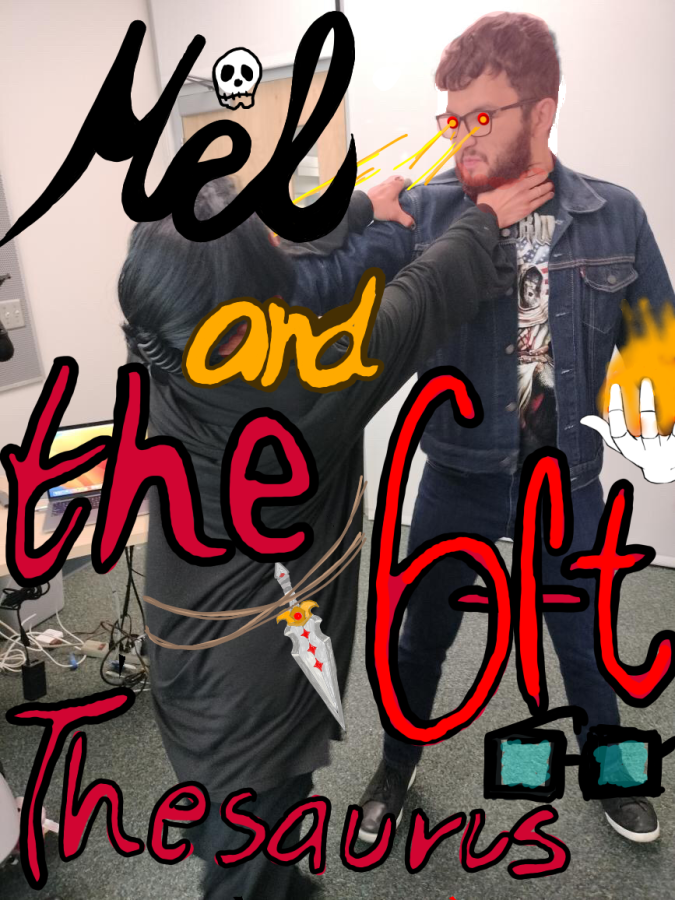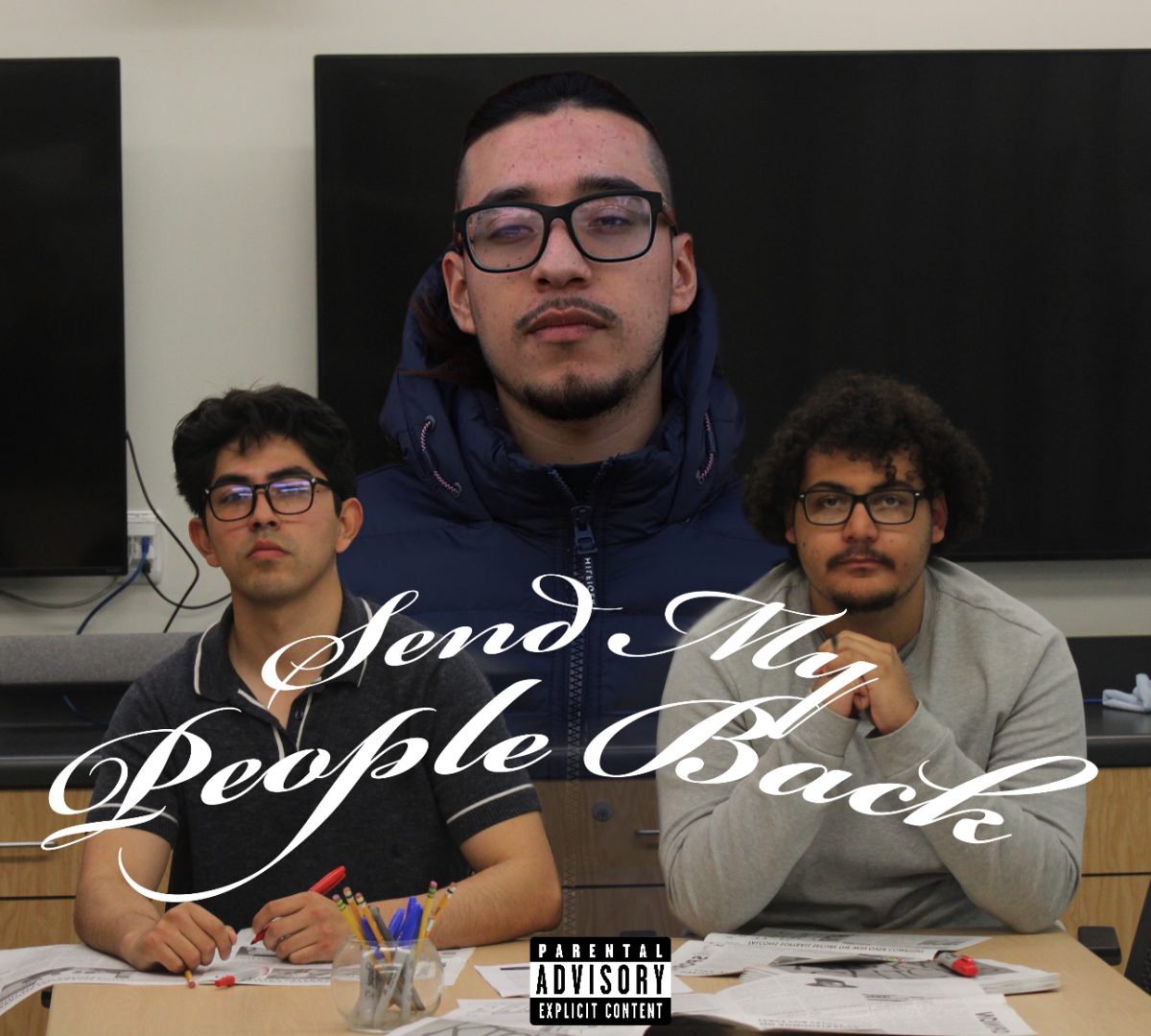Darryl: Hello. My name is Darryl Linardi and I am a staff member at Talon Marks and today, I have a guest with me.
Austin: Hey, what’s up? I’m Austin. I’m a music major, I’m a third-year and I’m excited to be trying Asian food.
Darryl: So on the topic that we’re going to be talking about today is, we’re actually going to be talking about Asian food and sort of like the weird, unusual foods that people living in America, such as us, don’t really get to see that often.
I like to talk about Asian food because it is part of my culture and I do want to spread it to everybody who’s listening to this podcast or anybody who wants to experience new things.
I think the first unusual Asian food when you hear of it is the fruit, also known as the “king of fruits”; it’s called durian. And durian is actually known for its pungent smell. But personally, as someone who grew up in a Southeast Asian family, I actually really enjoy durian.
Austin: Yeah, I don’t know what they’re talking about. That thing smells good, it tastes good and people that think otherwise are weird.
Darryl: And actually we do have durian right now. I did want to basically refresh my memory on durian.
Austin: Usually in America, we get that durian frozen, but you can buy it fresh in some places. I even went to Malaysia and had it fresh and that thing smelled crazy, crazy.
And honestly, I would even say it smelled pretty bad because it was super fresh. I think it being frozen suppresses the smell a little bit, but like even the texture when it’s frozen, it’s almost like ice cream.
Darryl: I mean, yeah. I don’t remember the last time I had fresh Surian. Usually, I do get my durian frozen at the supermarket. I have become acquired to the taste. And I do know that there are some Asian American people, such as my sister, who actually doesn’t like durian. It’s definitely sort of an acquired taste that people have.
Austin: I don’t even think it’s the taste. I think the taste is good for everyone. Once you get past the smell. I think once they get past the smell, everyone likes the taste.
I don’t even think the taste is bad. It tastes like sweet fruit that’s usually frozen, but it’s just the smell. If you get past the smell, I think you’ll enjoy it.
Darryl: Yeah. So some people have said online that the smell of durian actually smells like old socks or somewhere along those lines. But personally, I enjoy it for the taste. The taste is very sweet.
Austin: It does taste a little bit pungent. It’s not full sweet. It could even be a bitter aftertaste.
Darryl: Well, another Asian food that I did want to talk about, which you’ve had. I’ve actually not had the opportunity to have was balut and how would you explain balut?
Austin: Balut, you see people from Vietnam and the Philippines have it all the time, but it is a duck embryo egg and you basically eat the egg before it hatches. So it’s like your prime time.
So you boil the egg, and you break into it and you basically can see like a baby duck. It looks like an undeveloped baby duck in this egg and you’re eating it.
I would say it tastes good. I mean, once you get past looking at it. I think it tastes just like duck and the other half of the egg just has a really nice egg yolk portion. That part is also what everyone likes if people want to skip the meat. It usually just means more for me.
Darryl: Well, when you’re talking about balut, how do you get past looking at the egg? Because honestly, for me, it does look very menacing and very scary to eat. So how would you explain it to someone new?
Austin: I mean, we eat animals all the time, right? But those just happen to be parts of the animal. We just never eat like the whole thing.
I eat random food all the time and I feel like I grew up eating it. So it’s very easy to down and I have no problems looking at it.
I mean, maybe it’s a kid. I got a little bit guilty. Like, I felt like I was ruining the duck’s life, but I think most balut doesn’t have the chance to even hatch, even if you left it out. I’m almost certain that’s how that works.
And like, I even had my friend try it on his birthday pretty recently. And he just said, you know, bottoms up. He just tried to do it in one go and he just enjoyed the taste. I feel like once you understand that, you eat it like a food and you do it for the flavor and stuff like that, then you kind of get past the looking thing.
Darryl: I did hear that half of the balut is basically drinking the balut, basically. So can you explain to me what you are drinking exactly?
Austin: Honestly, it’s like a whole, whole process when you eat balut. You got to prop it up, crack it open, you pull off some of the eggshells and then you pull off, I don’t know what you call it, but it’s like a membrane that separates the shell from the inside.
You pull that out and what most people would do is they put salt and pepper in the egg, and then they’ll proceed to drink from the egg like a soup.
It’s actually a really good-tasting soup. Like, if I could have a soup by itself, I would totally go for it. But yeah, it’s like a small shot of like duck soup and that’s what most people do. They drink that because it’s very like there’s a lot of liquid inside and then you’re gonna drink that.
Darryl: And one of the concerns that I’ve heard about eating balut is that there are bones that you can actually feel, like small little bones.
Austin: I mean, the bones are so soft. You bite into it. It doesn’t even crunch. Imagine eating cartilage. It’s super soft and they aren’t like, rubbery, like cartilage, but they’re just as soft.
They kind of just break down when you bite it and you barely even notice it because you won’t. You don’t want to eat it slowly. You mostly want to nom it down. I think that’s the process of how you eat it.
Darryl: And how often do you eat balut? Like when was the last time you tried it?
Austin: Whenever I get the opportunity, my parents actually bought it.
I had the opportunity to eat it like a couple of weeks ago, but I didn’t. But before that was probably like two months ago. It’s not something I like to eat all the time, but it’s a fun thing to eat because it’s not exactly cheap.
Normal eggs are pretty inexpensive, but those eggs can come out to a dollar each, and that’s a lot for an egg.
Darryl: Would you consider it a delicacy?
Austin: I would say I wouldn’t eat it on a daily basis. So if I’m ever going to eat it, I’m eating it for the experience. So I guess it is a delicacy.
Darryl: As we transition, we have another snack which might not be unusual, but it may sway some people off. We actually have wasabi-flavored rice crackers. What would you describe wasabi as?
Austin: I honestly don’t even know how to explain it. It’s spicy without the spice. It will purely fill up your nose with a pungent burn when you eat a lot of wasabi. But I think the spice itself is good.
I think it’s compared to horseradish because that’s what it really is. At least wasabi you could buy, is made mostly of horseradish. And these chips are way more spicy than what wasabi is honestly.
Darryl: Honestly, when I’m eating these chips, it does give a strong sensation at first, but then it does go away. Like, sort of quickly after. I think it’s that initial burst of spiciness, I would say, that you have to overcome first.
I don’t usually eat wasabi, but they do provide it when you go eating at a sushi restaurant or any other restaurant.
Austin: And yeah, I think that is a unique attribute of wasabi is that it doesn’t really linger. When you eat wasabi, the most it’ll do is overwhelm you.
It’ll start and you will tear up if you eat too much and it’ll hurt your nose. It won’t last for more than 10 seconds and I think that’s actually a really good point.
It’s just a good thing to have to make your thing a little spicy without ruining the taste of stuff that you’re going to eat later, which is actually something so interesting. I feel like there’s no other way to experience it other than just having wasabi.
Darryl: As we go away from wasabi, one of the things I wanted to bring up was, have you ever had a uni before? Or “sea urchin?”
Austin: I’ve had uni and I could not stand it as a kid.
It is so creamy with such a weird pungent taste. I could not handle it as a kid. I remember as a kid I just could not handle it. I spit it out.
I think the fresher it is, the less pungent it is, but recently, I can eat it now. It tastes really good. It’s so creamy. It’s very hard to describe because it’s that kind of creamy.
Darryl: Some people eat it fresh and I actually had the opportunity to eat fresh uni. I think somewhere close to SoCal because it’s so close to the ocean.
I ate it straight out of the sea urchin body. For me, I am a big texture guy. I personally could not eat the whole thing, but I do know that it is a staple food in Japanese culture or any other Southeast Asian cultures.
Austin: I think uni has a creamy taste and it’s so iconic that they even add it onto like pasta. They even got like, uni pasta.
Uni pasta is so common because it mixes so well with the pasta. It just goes right around like a sauce because you can break it down and it just adds that pungency that it enhances your pasta eating experience. It’s nice.
Darryl: It’s not something a lot of Americans would experience on a normal basis. Would you also say that uni is sort of a special kind of food in that sense?
Austin: Oh, it’s definitely a delicacy. Sea urchin and uni in general is super expensive over here. Even in American culture, I feel like American culture emphasizes food being cooked. I feel like a lot of American food is not eaten raw. Well, we can blame our food health standards.
Other countries eat food raw all the time, but I feel like in America everything’s cooked. Even sushi, while it is not a common delicacy, but it’s definitely as not as many people eating it as people would eat steak or anything like that in this country.
Darryl: And ending with that, I do want to invite anybody who is listening to this to try the foods that we try today.
Maybe go to your local Asian supermarket and get yourself a pack of durian or just any other Asian snacks that you would like to try because I open the food to anybody who wants to try it for the first time in their life. And who knows, maybe you’ll like it.
Austin: I mean, there are so many foods to try. There are definitely going to be some that you enjoy and some that you won’t. So just be open-minded and try some new food. If someone likes it, you might like it too.
Darryl: Yeah. And that’s our first podcast on unusual Asian food. I’m Darryl Linardi.
Austin: I’m Austin Tran.
Darryl: And thank you for listening.


















